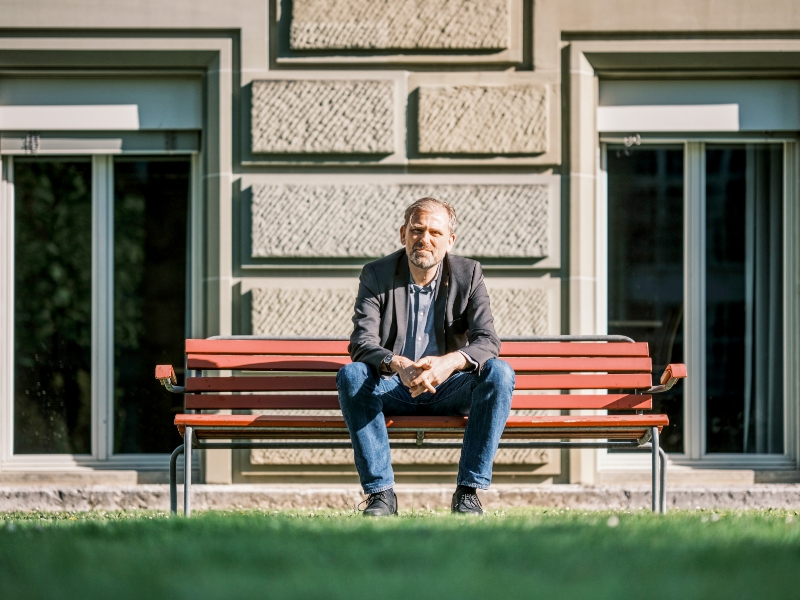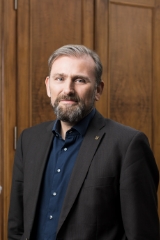Higher education
“Excellent teaching inspires passion”
The University of Bern wants to educate its students to become competent members of society. For Fritz Sager, Vice-Rector for Teaching, direct contact with students is key to this, and he recommends that students engage in an international exchange.

Fritz Sager: In a nutshell, the University of Bern is a place where students receive key resources for the future, namely skills and contacts. This means that the University is the place where I obtain the relevant knowledge for my professional future, no matter what I do afterwards. And here I also develop a network of important contacts. That could mean colleagues from Unisport or relationships in professional networks. This network will remain with me even after my studies, including through associations such as Alumni UniBE.
Does this description not apply to every university? What is so special about a university and what makes it different from a university of applied sciences?Of course, the universities are similar, and the distinction cannot be made so clearly. We all want students to become mature and competent members of society. However, a university is more on the side of basic research and a university of applied sciences more on the side of application. The university also has a mandate to conduct exploratory research, i.e. to find out things that nobody has asked about before.
But the university also wants practical relevance, has spin-offs and wants to get involved. In essence, both types of higher education institutions generate benefits for society and thus move the world forward. However, we tend to impart skills rather than a specific career. Our graduates are nevertheless very successful and find jobs because they have analytical skills that can basically be used anywhere.
University teaching comes directly from research. Students can expect to experience state-of-the-art research with us. We are a face-to-face University, but we want to achieve a perfect complement with digital teaching. That’s not easy. We have an excellent infrastructure for digital teaching. We also conduct research into digitalization in teaching and implement these findings. For example, we are opening the Graduate School “Digitality and Education” (GSDE) together with other universities in Bern as part of the BeLEARN competence center. Here, we focus on the interface between technology, education and didactics. Our aim is to further develop digitalization and teaching together. This is what makes the University of Bern special.
Students always have expectations of a course of study. Have they changed in recent years?I cannot say for certain whether it is the expectations of the students or whether we have become more sensitive to their needs. What is certain, however, is that there is a shift towards more advice. Students need support to find their way around the University. That’s why we offer orientation days and various consultations.
In addition, knowledge is becoming more and more extensive, and the disciplines are developing further. This is a challenge for secondary schools. They have to incorporate more and more learning material. There is a risk that the gap between what baccalaureate students can do and what we demand as a basis for the bachelor’s degree program will become too large for individual students. That’s why we also offer online learning modules designed to fill gaps from the baccalaureate and online self-assessments for choosing subjects.
“Our aim is to further develop digitalization and teaching together.”
Fritz Sager
What are online self-assessments?These are online modules developed by the University that prospective students in certain disciplines can use to find out in advance whether the subject is really what they are looking for. Often, their ideas are not entirely congruent with what a subject entails. It’s not clear to everyone from the outset that you also have to know a lot of mathematics and statistics to study psychology, for example.
How important is international exchange for students?International exchange is very important, but it is not being used enough yet. When you leave your familiar environment, you are forced to open up to new influences. But if you’re in your familiar environment, everything is “business as usual”. It is also a misconception that the same subject is taught in the same way at every university. The subjects are so diverse that it can only be good to see them from a different perspective. Membership of the European Enlight alliance has given a further boost to international exchange, and we are developing new forms of exchange with our partner universities.
What is exciting about teaching for you personally?For me, it’s personal contact and interaction: It is about imparting knowledge through exchange and being challenged by the questions posed by the students. This presupposes that the students get involved, contribute their questions and critical remarks and do not perceive a university as a mere “feeding institution”. But I think our students are doing very well here. In spite of rising student numbers and the need for classical front-end teaching formats for large numbers of people, lecturers must always be aware that what is really special is the fact that we can be in direct contact.
In other words, rising student numbers are a challenge for teaching?There are certainly disciplines in which this is a major challenge. For certain student numbers, we have to resort to formats such as large mass events, contrary to our better knowledge. At the same time, we know that we will have better learning success if we offer competence-oriented, problem-based courses in which we can actually accompany the students. This is not the case for a lecture with 300 students. This raises the question of the added value of a lecture compared to a podcast.
About the person

Fritz Sager
is Vice-Rector for Teaching and Professor of Political Science at the KPM Center for Public Management at the University of Bern. His special areas are the implementation and impact of public policies, the relationship between science and politics, and the political role of administration.
We are very keen to talk to the teachers. For example, the Day of Teaching takes place before the start of the spring semester. Here, we address topical issues such as in-person teaching and digitalization. In February 2025, the event will focus on performance evaluations in the age of artificial intelligence. This applies to practically all disciplines, all teachers and all courses.
You spoke indirectly earlier about the quality of teaching. Is this checked regularly and, if so, what form do such checks take?We have different forms of quality assurance. For example, we regularly conduct course evaluations. This is the grading of a course from the point of view of the students. The course evaluation is very important as feedback for the lecturers. They are obliged to discuss the results with the students and to take action if their teaching is not well received. If they receive an unsatisfactory evaluation several times, they are obliged to attend a continuing education program.
And what criteria are used to decide whether to introduce a training course? Do you listen to what people are asking for? Or do you choose a topic that you would like to teach yourself?It's a bit of both really. There are also degree programs that are phased out and then discontinued, but which were quite in demand before. These are usually very specialized disciplines, and the University must also have space for them. We live off this diversity. But if there is very little demand for an offer over a long period of time, then you have to question that at some point. And, of course, developments also come from society. For example, digitalization has led to new courses.
What is the difference between good and excellent teaching?Good teaching imparts the subject matter and the students recognize a benefit. Excellent teaching inspires and teaches something that students would not otherwise receive. It’s about sparking passion and making a lasting impression.
Subscribe to the uniAKTUELL newsletter

Discover stories about the research at the University of Bern and the people behind it.

